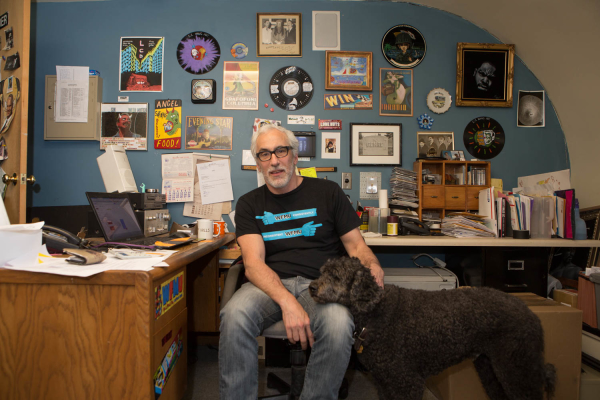
Shot by Greg Pallante
A fun fact about me, I used to be a Hip Hop Director at my college radio station back when I lived in Montreal and had a morning show “Hip Hop with DJ Coko and Big Dave” ( I don’t know why I chose such an awful nickname). After two years of being on the radio, I thought it was my calling, I was pretty darn good at it except for the many pink slips I got for swearing on air (“but it’s a hip hop show” I would say!). Then life happened and here I am.
I heard about WFMU when I first moved to Jersey City and immediately downloaded their app on my phone so I could listen during my morning runs (fun fact, in 2007 they were the first station to stream life audio to the iPhone). WFMU is an independent freeform radio station, it’s one of the few left that isn’t inundated with commercials and the repetitive playlist that consists of Taylor Swift and Beyonce. Not that I have anything against that (I actually love my Top 40) but it’s nice to listen to something different; new music, talk shows, comedy etc. WFMU has it all.
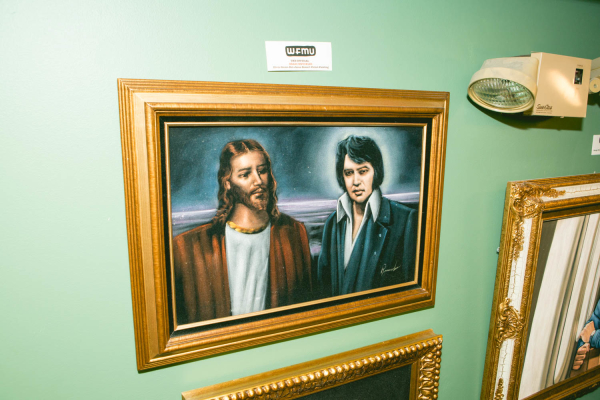
Friend and photog Greg Pallante, got me in touch with Pat Byrne, a WFMU Disk Jockey and host of a DIY variety show that happens once a month and is live from Monty Hall. After interviewing Pat (post coming tomorrow) I wanted to get the tour of the station and also meet Ken the Station Manager and Program director. I came back a week later, with my Robert Piersanti WFMU t-shirt and Ken gave me the whole story behind “the best radio station in the country.” It was the most incredible experience and I am so fortunate that I got this opportunity to see the whole station, including a seriously impressive record room that not many people get to see.
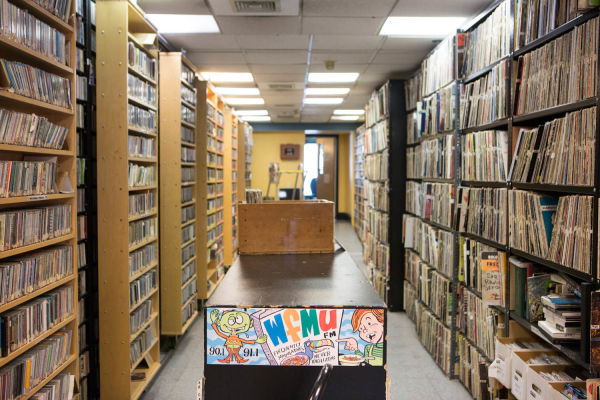
I also tried to convince Ken to give me a comeback radio show…so DJ ChicpeaJC might be coming at ya soon! Live from WFMU in Jersey City. #imnotworthy
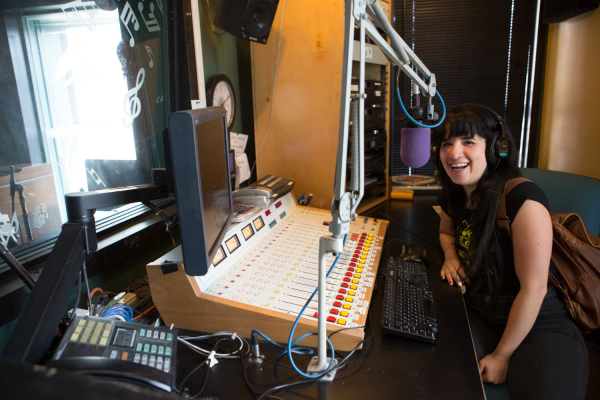
What’s your name? Ken Freedman
What do you do? I am the Station Manager and Program Director of WFMU.
What is WMFU? WFMU is an independent freeform radio station. It’s the best radio station in the world.
How long has WMFU been around? WFMU has been on the air since 1958 and I’ve been with the station since ’82.
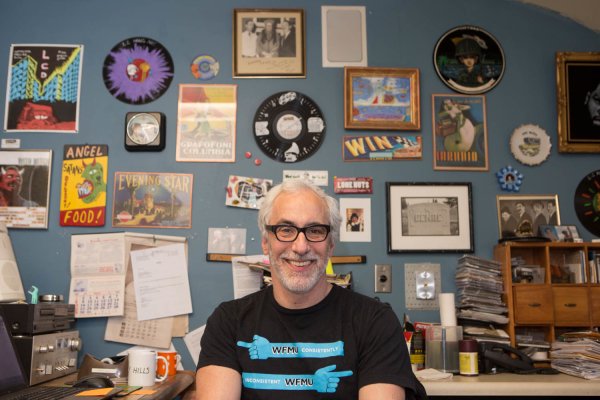
What is the history of FMU? How did it get to Jersey City? Well, we used to belong to Upsala College, but the school went bankrupt in 1995 and we were the only part of the college to survive the bankruptcy actions. Fortunately, we became independent just a year before that. In 1997 we bought the building in Jersey City and then moved here in 1998.
Do you cover all genres of music? What genres do you not play?
Nope. Well, I think there’s areas that we are very weak in, we’re very weak in Classical music, and we’re not so strong in Jazz. I wish we were doing better in Hip Hop, Beats and Electronic music.
How does FMU get their funding? We have a two-week pledge drive every March and that is where we raise most of our money. And then we also do a Record Fair in Brooklyn. We rent out a huge hall and invite 200 dealers from all over the world; about 4,000 people come to that event. Actually, our first two record fairs were in Hoboken and then we outgrew that spot. We moved to Manhattan and eventually got priced out of that space. Now we’re doing it in Brooklyn and have been for several years.
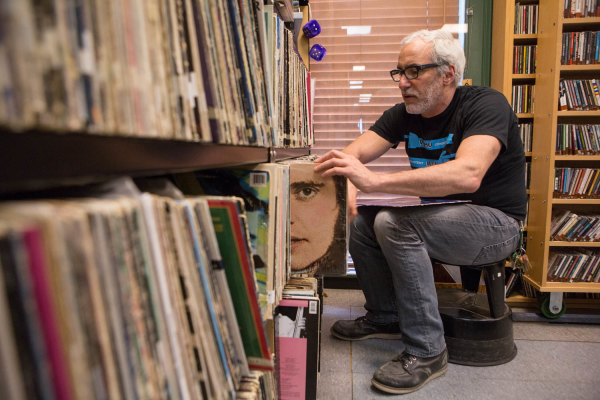
How were you able to keep FMU privately owned? It’s a non-commercial station so it’s not allowed to have commercials. It’s remained the kind of station it is because, essentially, the community–that was funding it at the time that Upsala College went bankrupt–bought it. So it was sort of preserved by its own community.
And is it going to stay that way, forever? Oh, yeah.
Can you tell me a little more about the other DJ’s that work here? We actually have six different channels of programming, it’s not just WFMU Proper. We have WFMU Proper which we also broadcast on the web and then we have five other channels of programming that are twenty-four hours a day:
Ichiban, Rock ‘n’ Soul: Vintage Rock and Vintage Soul and Rockabilly Channel
Give the Drummer Radio: Eccelctic Channel
Radio Boredcast: Experimental Channel
UbuWeb: Experimental Channel
Jewish Moments in the Morning (JM in The AM): Jewish Channel
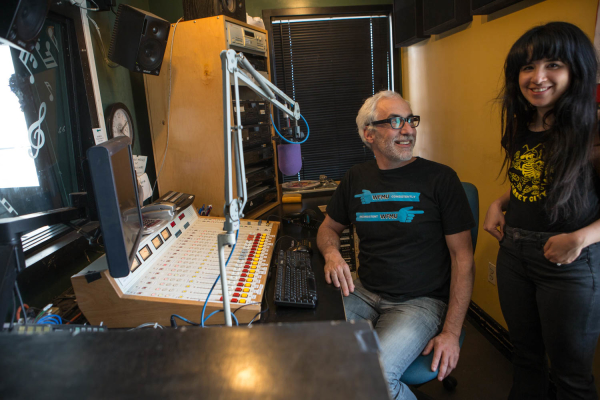
What is a Jewish show about? It’s Jewish talk and music, a lot of talk about Israel and a lot of weird Jewish music. It’s a really big deal in the Jewish community, and [that] has a twenty-four hour web channel as well.
What do you listen to out of all those channels? I listen to FMU Proper.
Do you have a favorite show? I can’t say. I’m like the daddy who can’t say which child he likes best. One of the shows I’m most excited about lately is Miracle Nutrition which is on Thursday nights from 7 to 8PM.
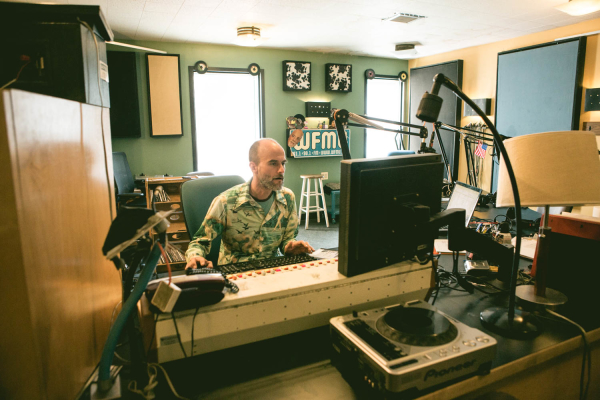
What’s it about? It’s this guy, Hardy White, who just talks for an hour and he’s sort of become the station’s spiritual leader. It’s kind of like Dada Self-Help Spiritualism.
What does he talk about? Anything and everything under the sun. How to leader a better life, but it’s very absurd.
Can you give me a tour? Sure.
“This is our weird sound dome here, which was painted by the New Zealand musician, Hamish Kilgour, and if you stand in the center and talk, it sounds very strange. But you have to get your mouth right under the center.”
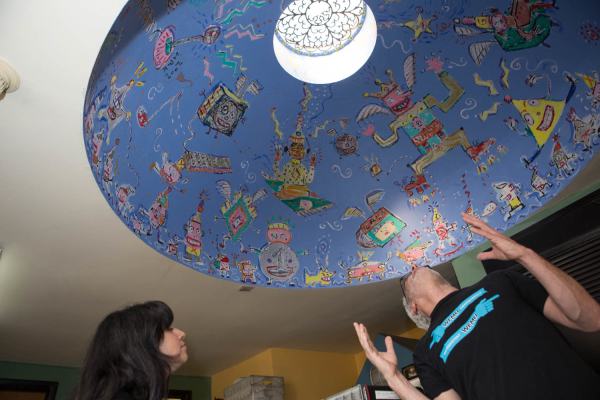
“These are toys that we collected over the years, for various web video streams. We do a lot of streaming of video as well as radio. There would be moments where there wouldn’t be anything visually interesting to show and so we would get all these windup dolls and things like that.”
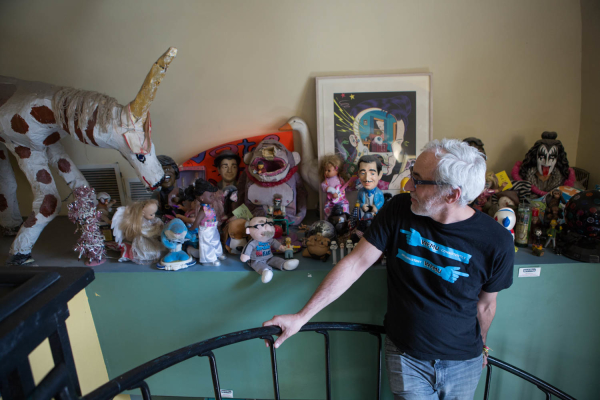
“This is Studio-B, this is where bands play live in the Live-room or the Love-room, across the way there, but we also broadcast live from this room, probably about a good six weeks out of the year. Whenever we do our pledge-drive this is where we broadcast from.”
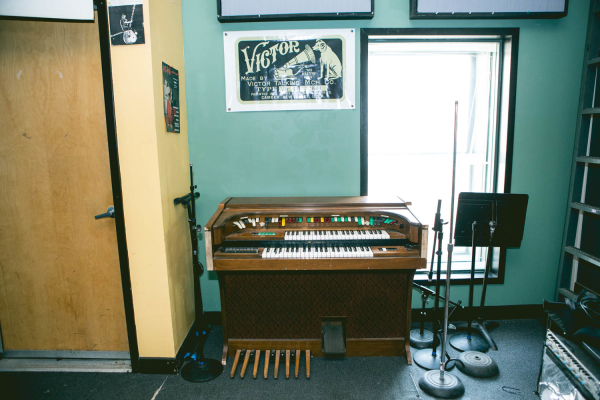
“Here we have a glow in the dark map of New Jersey in the bathroom which really does glow in the dark. We made it, but we can’t turn the light off in here because the light is broken. If we turn it off we won’t ever be able to turn it on again.”
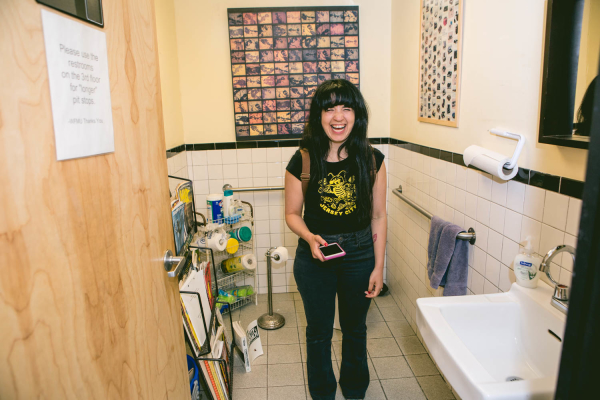
“We’re still unpacking from our Record Fair, this is the certificate we got when one of our DJs, Glen Jones, broke the Guinness World’s record for longest radio show. One-hundred hours, no sleeping, it became a big event and I guess he got really excited by all the attention he was getting. It was months in the planning. He was allowed to go to the bathroom every eight hours, but within that eight hours he had to actually pee in a jar. Guinness did have certain rules, he had talk at regular intervals, I think he had to talk at every fifteen minutes, at least. He wasn’t allowed to ever play a song that was more than fifteen minutes long. If he interviewed somebody they weren’t allowed to talk for more than a minute straight. There were all these rules.”
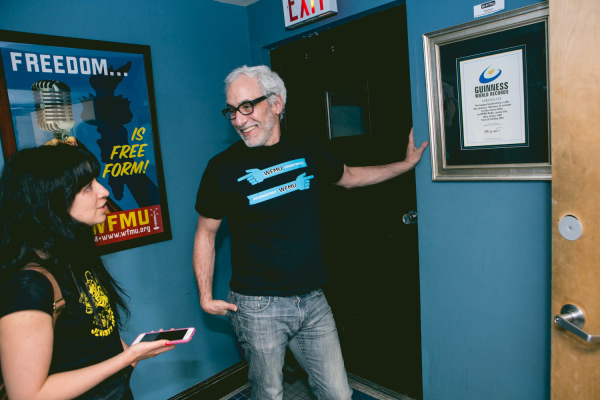
“He’s another studio, Studio-C.
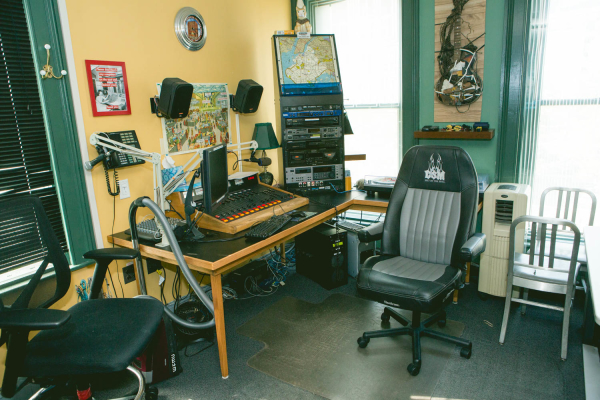
What’s the story behind these velvet paintings? I started collecting them right before we moved into the building, and I don’t know, it just became an obsession.
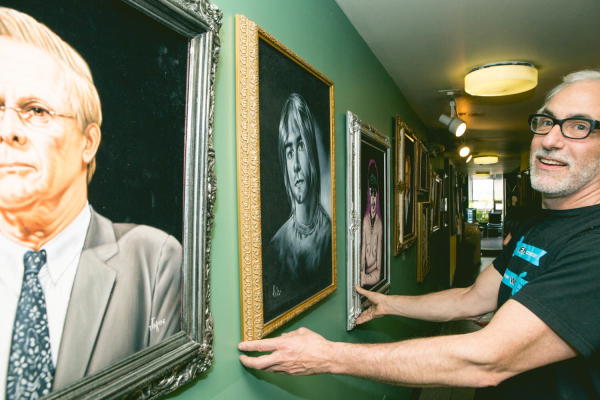
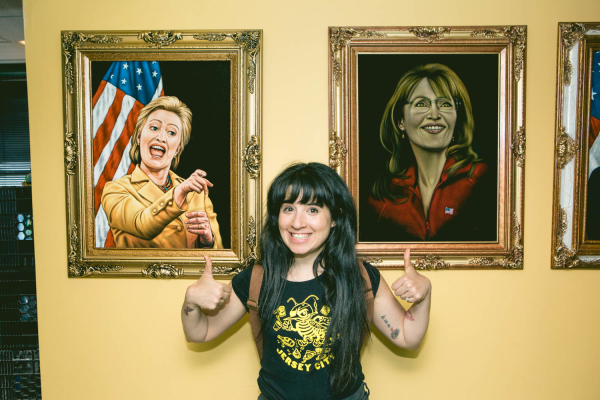
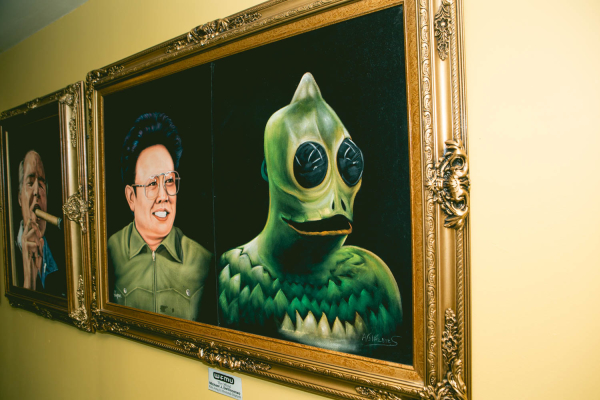
Who organizes all this [the record room]? We have a music director, it’s one of our full-time positions. But then there are people, there are DJs who only play MP3s. But most people do a mix, like on my show, I definitely play in a mix of vinyl CDs and MP3s.
Is it categorized based on genre? And what happens if something goes missing? No, it’s purely alphabetical. Things go missing all the time, it’s very frustrating. Almost all the records come to us for free, if they want them played on the air.
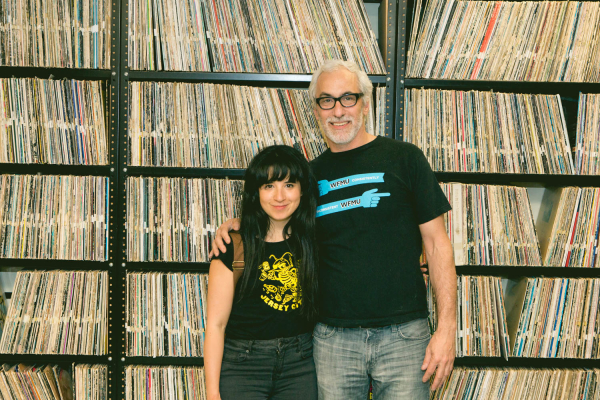
Any times where you had no transmission? What do you do in that situation? It’s not so common that you’re completely off the air because we broadcast on the internet and we have three radio stations. So the only time you go completely off the air is if there’s a blackout here in Jersey City, and that happened after Sandy, and then we broadcasted from people’s houses. We actually counted on different DJs who had setups at home to tap into our web servers and that’s how we stayed on the internet. Because for a week after Sandy, we didn’t have electricity here and none of our transmitters had electricity. We’d be on the air for three hours from Brooklyn, and then three hours from Hoboken, and then three hours from Jersey City. We set up this impromptu schedule.
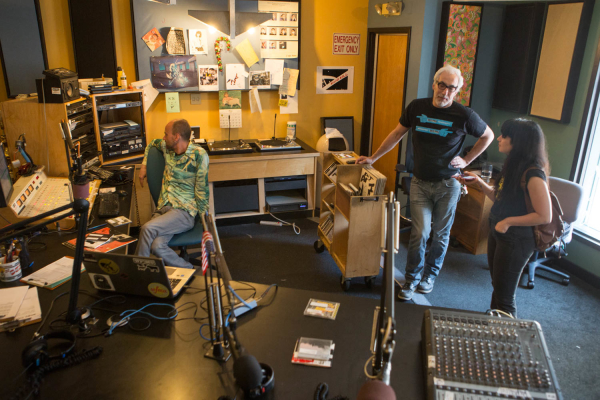
How did you get into radio? I started as a DJ. I always did a freeform show and then in 1990 or so, I started doing a second show which was a comedy show with Andy Breckman, my partner.
What kind of music were you playing? And what was the name of it? I’m one of the people who never named their shows. My show is just called Ken. Maybe half the DJs come up with titles for their shows and the other half it’s just their names. I play all sorts of weirdness, I look for things that sound like nothing I’ve ever heard before, and that comes from experimental music, international, electronic, just general weirdness and experimentation. And guitars, I like guitars.
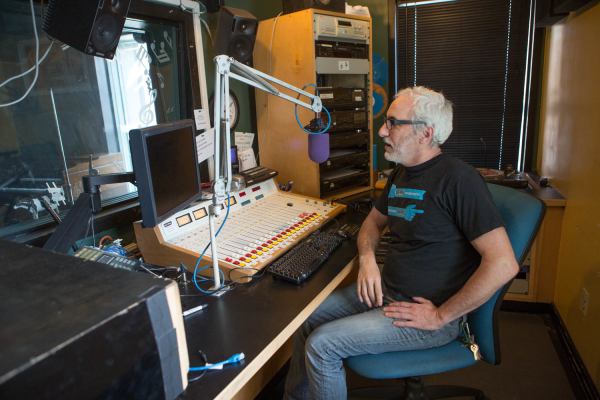
What got you into being a disk jockey? I started doing radio actually in high school, I was lucky that my high school had a radio station and then I continued doing it all through college. And then in college, a bunch of FMU listeners told me that my show, which I was doing in Ann Arbor, Michigan, sounded like it was a station that was called WFMU. That was how I found out about FMU.
Do you have a favorite Jersey City hangout spot? Monty Hall.
Why did you call it Monty Hall? We had a contest on coming up with a name for it and that just seemed like the perfect name because people used to refer to the building as 43 Monty, ‘cause 43 Montgomery. So Monty Hall just makes perfect sense.
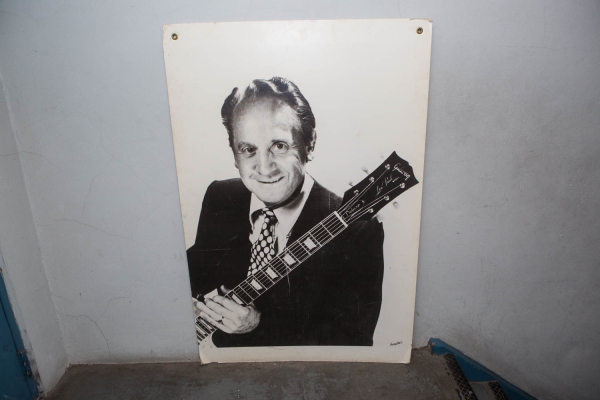
Can you tell me a little more about Prove It all Night and how it started? I knew Pat as a comedian even before he started doing his show on WFMU, so it just happened very naturally. I was familiar with his sketch comedy troupe, and then he started doing fill-ins on FMU and he was the first and only person who expressed interested in combining his on-air radio show with a regular event at Monty Hall and he’s just putting a huge amount of work into it and it’s been great.
What are you listening to now? Some of my favorite bands of recent times are an Electric band called Shomplit Chiggar, a Russian band called Khlam, a Japanese band called Ogre You Asshole. We like playing things that nobody else is playing, that’s sort of been a very, very long tradition on FMU. We’re sort of trying to play really good stuff that nobody else plays at all. Then there’s also a lot of comedy shows, there’s Pat’s show, talk shows, and phone-in shows.
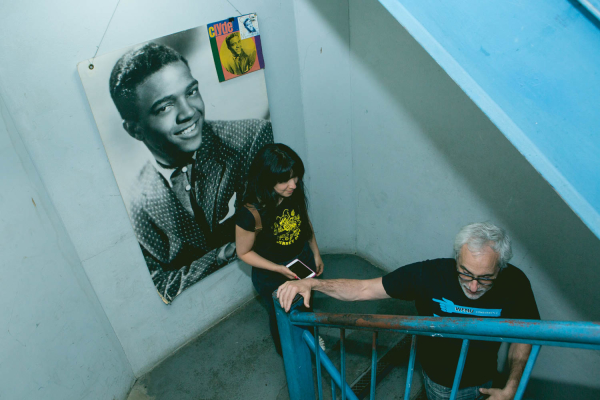
Any other talk shows that you can mention that might interest people? Well, the show that I do with Andy Breckmen, it’s called Seven Second Delay, it’s a pretty popular show. And a great show with two women hosts, Shut Up Weirdo, every week it’s a different topic and people calling up and telling stories, really, really funny stories. And then Monday nights, we have a new game show called Dr. Gameshow, it’s a different game show every week.
Do you listen to any local Jersey City bands? I do. We did a big event here with Rye Coalition and The Black Hollies, and there was this great Jersey City Electronic band we used to play a lot, Lismore, I don’t think they’re around anymore.
Can you tell me about the WFMU documentary? There’s a feature-length documentary film about WFMU, [and] it’s called Sex and Broadcasting.
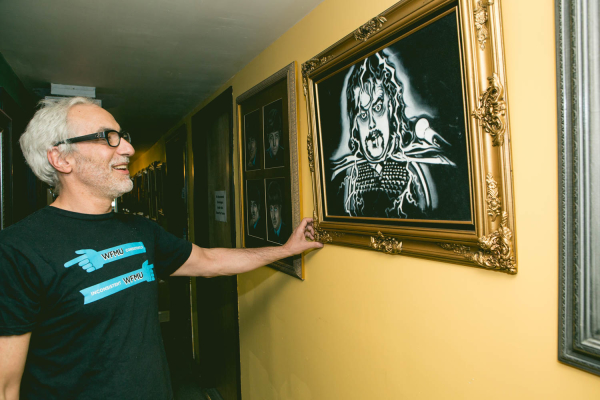
Why is it called Sex and Broadcasting ? It’s called Sex and Broadcasting because of this book here, Original Sex and Broadcasting: A Handbook on Starting a Radio Station for the Community, and this book came out in 1972. This book actually was responsible for hundreds of radio stations going on the air in the seventies.
How is the documentary shot? It’s sort of a year-in-the-life of the radio station and that year was 2009, which was a year that we had a lot of financial crisis because of the mortgage crisis.
Any future plans for the station? Well, we’re really excited about Monty Hall, having our own club. I’m also really excited about upgrading our whole digital platform, which were deep in the process of. We’re going to help other radio stations as well as journalists, and other makers of digital content with a lot of the technology that we’ve developed.
FYI – Lismore became The Golden Filter and is now located in London; they tour extensively throughout the UK and Europe.